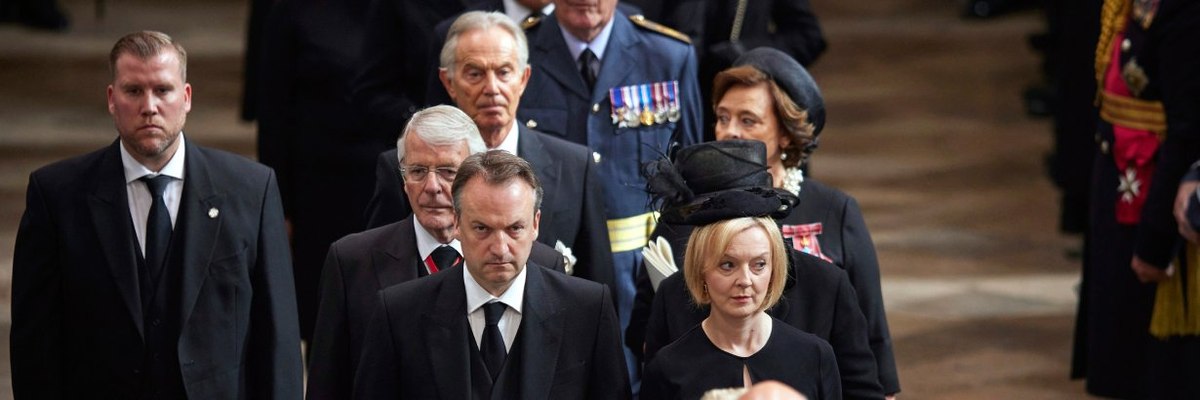On a brilliantly sunny morning in August 1974 I stood on the lawn of the White House and watched Richard Nixon board a helicopter that would fly him off to political oblivion. He had become the first president of the United States to be forced from office by a scandal that had transfixed the nation for more than two years. His crime had been his attempt to cover up the Watergate burglary by lying consistently.
You may wonder why I begin this column with something that happened nearly half a century ago in a foreign country rather than the political crisis embroiling our own nation as I write. It’s because America has something we do not have: a written constitution which lays down precisely how a president is elected, how that president can be turfed out of office and how he is replaced. The arguments for a written constitution in this country have been bubbling away beneath the surface for many years but making precious little progress. Have the extraordinary events in Westminster over the past weeks and months lent some urgency to that debate?
It's worth reflecting briefly on those turbulent years in Washington which I witnessed as a young BBC correspondent from start to finish. America was cursed with not just a crooked president. Its vice president, Spiro T. Agnew, had been forced to resign a year earlier when he pleaded guilty to tax evasion. The constitution spelled out precisely what had to happen. The leader of the House of Representatives, Gerald Ford, became vice president in his place. That meant that when Nixon was forced from office Ford, who had granted him a pardon, automatically became president.
In the wake of the greatest political scandals in the nation’s history power had passed seamlessly. The fact that a political crisis of this magnitude was unprecedented mattered not a jot. The framers of the constitution had done their job well. The United States Constitution has served as the supreme law of the United States since it came into effect in 1789. Obviously, the world has changed rather a lot since then, but the framers anticipated that and allowed for amendments. There have been 27 of them over the centuries, most of them encompassing a Bill of Rights. The system works.
We tend to describe what the UK has as an “unwritten” constitution and its supporters claim that it serves the nation well. Its opponents beg to differ. They say that when political crises strike it is found wanting. Which takes us back to the turbulent times we are witnessing in Westminster as I write. Specifically, to the resignation of a prime minister after a risible 44 days in office. A prime minister virtually unknown to the public as a whole and who was elected by a tiny minority of the population. So when things started to go badly wrong for her and the markets effectively destroyed her plans for the economy, there was no reservoir of support to which she could turn.
Opponents of our electoral system say it is simply unacceptable for a prime minister to have won power in an election in which fewer than 142,000 people voted: all of them members of the Conservative Party. Nor are they happy with the plans for the election that begins on Monday.
This time, of course, the rules have been changed. The candidates must win the backing of 100 Tory MPs if they are to face the membership. If more than two manage it, MPs will vote again in what is called an “indicative” ballot. Only two will be allowed through. So there can be no repeat of the last election and it will all be decided by Friday. What the party bosses hope will happen is that one of the final two will drop out so there’ll be no need for an election at all.
Those who believe we should have a written constitution say this is simply unsatisfactory. That’s partly because it is simply unclear: we seem to make up the rules as we go along and the election of a prime minister is an example of that. In theory it is obvious that the leader of the majority party in the legislative chamber should become prime minister but, they say, what happens if that leader loses the confidence of the majority of their party – which is exactly what we are seeing right now? Well then you hold another election. But what if the electorate had put that party into power because they wanted Joe Bloggs (or Boris Johnson) to be prime minister? And what if you end up with a leader who does not command the support of a majority in the Commons? Can this really be considered a fully democratic process?
The UK is unusual in not having a written constitution, in the sense of not having the fundamental rules of the constitution codified in a single document. It is one of only a few democracies in the world which lacks one, alongside Israel and New Zealand. As the Constitution Unit website states: “What Britain has instead is an accumulation of various statutes, conventions, judicial decisions and treaties which collectively can be referred to as the British Constitution.”
There’s at least one perfectly good reason for that. It’s a very long time since we have had what the legal brains call a “constitutional moment”. In other words, what you or I might recognise as a revolution. Think of the American or the French revolutions or those many countries who were once ruled by colonial powers. Britain has not experienced a revolution since 1688. Instead of that, our constitution has evolved slowly over time under relative stability. It has never been deemed necessary to list the fundamental laws and principles underpinning the country’s polity. That is no longer the case, according to the law professor, Sionaidh Douglas-Scott of Queen Mary University of London.
But if we were to have a written constitution what should be in it? Here’s her summary:
“It would have to accommodate the entrenched protection of fundamental rights. This would necessarily, at times, involve overriding parliamentary sovereignty, which would change the very nature of our constitution. It would also have to entail a complete and clear devolution settlement. Finally, it should involve a re-evaluation of our electoral system. It should consider changing First-Past-The-Post to a system of Proportional Representation, and stifle parliament’s ability to pass (and repeal) extremely important legislation with a majority of just one vote.”
It would also, of course, “stifle” the ability of a very small group of MPs and party members to subject the nation to the sort of shenanigans we have been witnessing over the past weeks.
When a select committee of the house of commons looked at the wider question of a written constitution ten years ago this is what it had to say about the status of the prime minister: “The Prime Minister remains in office until either: Following a General Election, the Prime Minister is no longer able to command the confidence of the House of Commons, or the Government loses a vote of no confidence in the House of Commons and a replacement government cannot be found within 14 days, or The Prime Minister resigns. Possible alternative: The Prime Minister shall be directly elected by the people [in a two-round ballot]. OR The Prime Minister shall take office following nomination and confirmation by the House of Commons. The Prime Minister’s term of office shall be 5 years, renewable.”
And what was the result of that committee’s deliberations and conclusions? I hardly need spell it out after the weeks of torment that we, the poor bloody infantry, have just endured. Zilch.
There is, of course, another way of looking at all this. Yes, we’ve had a miserable time of it and even her best friends would probably not deny that Liz Truss deserved her fate. But, we could argue, that’s democracy for you. We don’t always get what we want. How could we? The very essence of a winner-takes-all electoral system is that there are losers too. And who knows… in a couple of years from now we might, perhaps, be congratulating ourselves on our wise choice.
Then again… What’s your view? Do you think it’s time we had a written constitution and, if you do, what would be at the heart of it? And if you had a vote in next week’s election who would be your choice?
Let us know.








